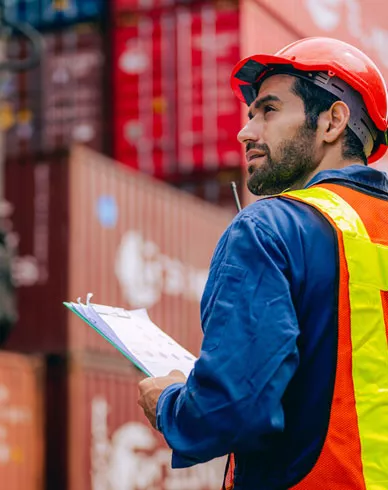ESG: Commercial real estate's next big investment
 How new ESG regulations will influence New York’s commercial real estate industry—and its customers
How new ESG regulations will influence New York’s commercial real estate industry—and its customers
The New York City skyline is one of the world’s most recognizable silhouettes — and for good reason. The iconic grandeur of the city’s skyscrapers and historic buildings represents one of the most rapidly changing commercial real estate markets in the world. From the Empire State Building to One World Trade Center and 30 Rock to the ever-growing number of high-rise apartment complexes, historical landmarks and new innovations decorate this city in the sky. Accordingly, the NYC market is also one of the most competitive, with commercial real estate stakeholders contending over finite space and a limited number of properties on just over 300 mi2 of land.
In recent years, the commercial real estate market in NYC has been impacted by several headwinds. Most notably, the COVID-19 pandemic and the accelerated shift to remote work have led to a decreased demand for office buildings. By some estimates, weekly office occupancy rates in NYC are down by 50 percent as compared to pre-pandemic levels, and despite a few outliers, many companies are adapting to hybrid work schedules. As the long leases that carried landlords through the pandemic come to an end, many companies are opting to decrease office space or opt out of physical offices altogether.
In addition to contending with shifting ways of working, commercial real estate (CRE) companies are also keeping an eye on increasing environmental, social, and governance (ESG) regulations. Government entities across the globe (e.g., European Union, UK, and New Zealand) are already enhancing and standardizing ESG reporting requirements — and the proposed SEC Climate Disclosures, if enacted, would do just that for US companies too. This would require companies to disclose material climate risks, greenhouse gas emissions, emission reduction targets, and transition plans. Along with SEC regulations, the UN Sustainable Development Goals have become a common framework in both domestic and international communities, used to gauge the societal impact of organizations against the universally adopted 2030 goals.
Keeping customers at the forefront of ESG initiatives
Along with these regulations, commercial real estate companies must take into consideration the ESG goals of the customer chain they’re serving. Pressure to reduce environmental impacts is mounting as institutional investors, investment managers, owner/operators, property managers, and tenants become more aware of the importance of sustainability and responsible business practices, demanding that commercial real estate properties support their organizational efforts. This has led to a growing need for energy-efficient properties, green technologies such as solar panels, and a reduced carbon footprint. If these needs are not taken seriously, commercial real estate companies run the risk of negatively affecting their customers’ sustainability and environmental scores too.
Commercial real estate is a significant portion of every company’s footprint, with estimates that “buildings account for 37% of today’s global CO2 emissions.” As such, there’s a possibility that customers, in an effort to reduce their environmental footprint and carbon emissions, will look to downsize their office spaces in the future. To mitigate this risk and become a more attractive partner to customers, commercial real estate companies need to take sustainability seriously or risk losing tenants in an already shaky market. Focusing on new technologies and strategies to improve sustainability will be increasingly more important as the industry competes for a shrinking customer base.
As an example, an office building in Seattle replaced its windows with smart glass, reducing its energy consumption by 18%. The real impact, however, was the “improved tenant retention and attraction, which resulted from addressing occupant comfort” and consumer desires for greener living and working environments. According to the Urban Land Institute, “by providing improved thermal comfort, the owner was able to renew existing tenants and lease two empty floors for $5 per square foot more than before the window replacement.” This situation shows how critical it is to collaborate with customers to understand their sustainability and hybrid workplace preferences, then accelerate the transformation required to meet their needs. As companies adapt to the “new normal,” commercial real estate businesses must learn to rethink the services, amenities, and strategies they offer to attract and retain customers.
The road to sustainability is paved with data
The time is now for commercial real estate companies to take initiative and position themselves for the proposed environmental regulations and shifting consumer preferences. Should the upcoming rules be finalized, large public companies will likely have to disclose climate information for the fiscal year 2023, filing in 2024, while smaller companies will likely have a longer grace period.
A majority of companies have already begun to understand and assess their current ESG performances, identifying a baseline and areas of strength, weakness, and opportunities. At its core, this is a significant data collection challenge as organizations seek to source data from utility companies, fleet vehicles, procurement spend, business travel, etc. Many companies are now confronted with mass amounts of data stored in spreadsheets, making it difficult to audit and lacking the transparency needed to build a culture of sustainability across organizations. As companies develop and refine their ESG strategies, approach, and goals, it’s helpful to consider sustainability management software that can help standardize and visualize sustainability data.
Salesforce Net Zero Cloud
One consideration is Salesforce’s Net Zero Cloud, which can help integrate a complete sustainability management solution seamlessly into your organization. Because of its streamlined integration with existing Salesforce ecosystems, Net Zero Cloud can be broadly implemented, giving employees the visibility needed to engage with the cause. In fact, when Slalom embarked on its own ESG initiatives, we used this very system to help manage and organize emissions tracking and progress against our environmental initiatives (you can read more about that here). Another benefit of the Net Zero Cloud solution is the ability to manage sustainability initiatives and align these efforts to the UN Sustainable Development Goals. Slalom’s clients use the Net Zero Cloud platform to move beyond carbon accounting and take action. The accelerator helps centralize corporate ESG goals, helps guide employees on how to align their work to these goals, and captures performance metrics, making it easy to share best practices and confidently go to market with storytelling around key wins.
Microsoft Cloud of Sustainability
Another option is Microsoft Cloud for Sustainability, which helps drive operational and cost efficiencies to allow organizations to meet their sustainability goals. Through data records and reporting insights, Microsoft’s Sustainability Manager helps organizations set goals and take action to reduce their emissions footprint and transform their business.
Client-specific ESG solutions
Even if Salesforce and Microsoft don’t fit the needs of your organization, Slalom has deep expertise and capabilities around building out customized ESG solutions. Regardless of the sustainability management solution chosen, it’s critical to ensure that commercial real estate firms can unlock siloed data and embed it into their processes to help drive a culture of sustainability and impact, both internally and for their customers. For ESG efforts to stick, leaders and change makers must have a holistic view of sustainability and continually integrate sustainability and impact thinking into core business strategy and organizational models that ultimately transform culture and behaviors within the company. Having data and measurement standards and practices in place helps organizations begin to build that culture internally, helping to ensure the long-term success of their ESG goals.
Wherever you are in your ESG journey, Slalom’s ESG strategy team can help with:
- Strategy delivery & impact tracking
- Sustainable products & services
- ESG digital transformation
- Decarbonizing the value chain
- Culture of sustainability & impact
- ESG risk & governance
The path forward
The shifting focus to ESG poses a unique opportunity for commercial real estate companies that act now. In the NYC market specifically, the fast-paced, environmentally focused consumer base will respond increasingly well to real estate that’s positioned with a green strategy and data to back it up. While this will likely require some adaptation in the near term, commercial real estate’s cross-sectoral reach has the power to position the industry as a leading force in driving sustainability goals and improvements across New York, the country, and even the globe.
This blog post was originally published here.



